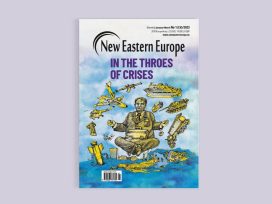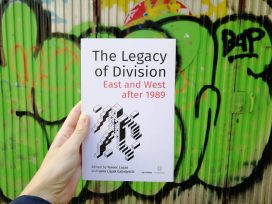
Incomplete Europe
New Eastern Europe 1–2/2023
What the war in Ukraine has taught us about solidarity; why European democrats must insist on fair play; and Moldovan democracy under hybrid attack.
Something of a clash of the titans seems to be emerging in Eurozine. In the latest addition to our series on the legacies of ’89, Ivan Krastev and Stephen Holmes argue that we are witnessing a backlash in eastern Europe against decades of ‘westernization’. They interpret the rise of illiberalism an emotional and pre-ideological reaction to the humiliation these countries suffered when trying to ‘join Europe’. In their account (first published in Journal of Democracy), the anti-migration movement is a discursive substitute for the real social tragedy of extreme outmigration.
In an article first published in German in Merkur, Aleida Assmann strongly refutes this analysis, accusing Krastev and Holmes of ignoring the eastern European heritage of dissidence in their reading of the sudden success of illiberalism as an outpouring of wounded national pride. ‘We do not have to tell the story of the European Union in the way they do; we can also tell a different story, in which this negative teleology intersects with alternative possibilities and perspectives’, Assmann writes, noting that drafting apocalyptic prophecies is a male intellectual attribute.
It is hard to argue with the latter statement. So I won’t. But I insist that a broader perspective does include the dissident legacy, ‘the pathos of freedom’ as the philosopher Gáspár Miklós Tamás has put it, while also allowing for a more fluid inquiry into historical failures.
Assmann accuses Krastev and Holmes of reinforcing the mythology of the victorious ‘West’, which, she states, has long lost its hold. And yet, multiple contributors to our focal point ‘The legacy of division’ point out that the imperative of ‘westernization’ – later styled as ‘Europeanization’ – was an unchallenged component of eastern European reality until 2008.
Jaroslaw Kuisz recounts the desperate attempts to ‘catch up with the West’. The rhetorical question ‘What would the West think of that’ served as a legitimate political insult for decades. Claus Leggewie discusses how the German unification process resulted in West Germany imposing its ways on the East, avoiding equal representation or mutual harmonization. Ondřej Slačálek suggests that the high hopes of democratization were what in fact led to populism.
Holly Case offers a key to making sense of how the anti-totalitarian heirloom got lost. Polish and Hungarian illiberals, she argues, are trying with all their might to substitute 1989 with 2008 as the year zero, so to erase the traces of any tradition other than their own fabrications. These include relativizing national responsibility for the Holocaust, if not the Holocaust as such. They also deny comprehensive remembrance of the state socialism.
Eastern Europe’s new authoritarians are positioning themselves not against the Soviet Union, let alone Nazi Germany. Their designated enemies are in fact the dissident intellectuals of the Soviet period and their latest offspring, ranging from human rights activists through investigative journalists to any grassroots citizens’ initiative – in other words, anyone who questions the status quo. When vilifying Brussels, they don’t mean the institutions of the European Union, which they gleefully use as a host body. Their attacks are aimed at domestic heretics who dare to hold them to a higher account than that of the wolf-pack logic of a hybrid cleptocracy.
The EU can and should be criticized for its unaccountability, its lack of solidarity – or its maintenance of a semi-periphery of compliant secondary markets. In her book Der europäische Traum: Vier Lehren aus der Geschichte, Assmann herself points out the ‘asymmetric European remembrance’ that never reconciled the eastern past with western narratives. This is a blind spot – dare I say: a floating gap – that the new authoritarians exploit, given that 1989 is on the brink of sinking beyond the horizon of primary communicative memory.
Assmann’s critique is often bitter, perhaps unjustifiably so. And yet nobody understands better than her, the brilliant theorist of collective memory, what is at stake in the process of transforming ’89 from experience to history. This explains her powerful demand to explicitly recall the endowment of the dissident tradition: she is stepping up as an actor in her own model of codifying remembrance, at a time when politicians are actively trying to wash it away.
This is not some minor detail for the entertainment of the anointed. The dissidence serves as a negative identification point for wannabe autocrats, because they are the last powerful example in these cultures of a plausible public morality. The current age denies responsibility, both as a necessity and a possibility. The bequest of those who resisted earlier tyrants, even without any prospect of success, is indeed the only means left to avoid the narrative of inevitable regression.
Drawing on both Krastev and Holmes, and Assmann, Ulrike Liebert transcends the duality of the debate, admitting that ‘while neo-nationalists tend to be too short-sighted, the politics of Europeanization may be too far-sighted’. To overcome the failures of European integration, she suggests improving the quality of its politics, its representativity, and makes the case for a new Europeanization defined as a ‘process of collectively learning from past mistakes’.
Eurozine aims to do just that: we will keep recalling the promise of ’89 throughout the year. Our annual conference, the 30th European Meeting of Cultural Journals this November in Berlin, will feature strong voices from this inquiry, among them Aleida Assmann, Ivan Krastev and Holly Case.

Réka Kinga Papp
Editor-in-chief
This editorial is part of our 12/2019 newsletter. You can subscribe here to get the bi-weekly updates about latest publications and news on partner journals.
Published 13 June 2019
Original in English
First published by Eurozine
© Eurozine
PDF/PRINTSubscribe to know what’s worth thinking about.

What the war in Ukraine has taught us about solidarity; why European democrats must insist on fair play; and Moldovan democracy under hybrid attack.

What is racism against eastern Europeans? And what did Viktor Orbán learn from Slavoj Žižek?